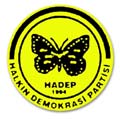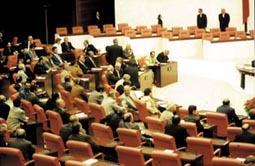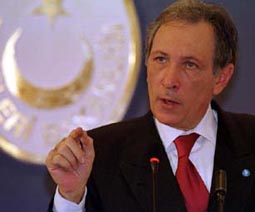07.
February 2000
![]()
1. "Turkey summons Belgian envoy over MPs' meeting with rebel Kurd official", Belgian deputies met with Osman Ocalan
2."Kurdish Drive for Human Rights will not be stopped", a top court bans Turkey's only legal Kurdish party, millions of Kurds will still wage a peaceful struggle to gain wider cultural rights, the party's chairman said in an interview on Wednesday.
3. "Turkish parliament passes controversial democracy reforms", the Turkish parliament on Wednesday passed several amendments aimed at bringing the country in line with EU democracy standards, overriding stiff opposition by a nationalist government party.
4. "Turkey to help lift sanctions if Iraq abides by UN decisions", Turkey has proposed to work for the lifting of the 11-year-old sanctions against Iraq if the Baghdad regime allows the return of arms inspections, Turkish Foreign Minister Ismail Cem said Wednesday.
5. "Iraq asks UN to press Turkey on US, British no-fly zones", Baghdad said Wednesday it had asked the United Nations to pressure Turkey into ending use of its airspace by US and British warplanes to patrol the "no-fly" zone in northern Iraq.
6. "Repercussions of scandal booklet continue", the repercussions of the controversial booklet distributed on Sweden's Business Culture Day, which claimed that the word "Turk" did not apply to a nation, continue.
1. - BBC Monitoring Service - "Turkey summons Belgian envoy over MPs' meeting with rebel Kurd official":
ANKARA 
Jan Matthysen, the Belgian ambassador to Turkey, was summoned
to the Foreign Ministry related with the meeting of the three Belgian
deputies with Osman Ocalan [brother of jailed Kurdistan Workers' Party
leader Abdullah Ocalan] in northern Iraq.
Sources said on Wednesday [6 February] that Foreign Ministry Intelligence and Research General Director Cenk Duatepe met with Matthysen. The sources noted that the views and reactions of Ankara regarding the issue were conveyed to Matthysen.
Foreign Ministry spokesman Huseyin Dirioz, responding to a question
if the ministry had launched an initiative regarding this issue during
the weekly press conference, said: "We have launched an initiative.
Our views have been conveyed to not only in Brussels, but also in
Ankara." ![]()
2. - Reuters - "Kurdish Drive for Human Rights will not be stopped":
ANKARA 
If a top court bans Turkey's only legal Kurdish party, millions
of Kurds will still wage a peaceful struggle to gain wider cultural
rights, the party's chairman said in an interview on Wednesday. "There
are millions behind us. You can close the party, ban its leaders,
but those millions won't disappear," said Murat Bozlak, who heads
the People's Democracy Party, or HADEP. "They will not leave the path
we have set," he told Reuters. The Constitutional Court is weighing
charges to ban HADEP for allegedly serving as a front for the separatist
Kurdistan Worker's Party (PKK).
HADEP denies the charges. Bozlak, facing up to 22 years in prison on related charges, said he believed recent reforms to Turkey's constitution, originally drawn up under military rule in the 1980s, may convince the Constitutional Court to spare his party. The case is the first test of the constitutional reforms, designed to meet European Union criteria that include making bans on political parties more difficult.
The EU has urged Turkey to expand civil liberties for its 12 million Kurds to smooth the way for talks about Ankara joining the bloc. It says party bans stifle democratic debate and encourage the disaffected to seek ever more radical outlets. State prosecutors filed the case against HADEP in 1999 when fighting still raged between Turkish soldiers and the PKK, which launched a guerrilla campaign in 1984 for self-rule in mainly Kurdish southeastern Turkey. More than 30,000 people have been killed in the violence.
DEATH ROW
Fighting has largely ended in the southeast since commandos captured PKK commander Abdullah Ocalan in 1999. From death row, Ocalan has called on PKK fighters to withdraw from Turkey and seek rights for Kurds through political means. "This (case) is because we said, 'Kurds exist'. That may have been enough to shut us down in the past, but it no longer means we should be closed," Bozlak said. "The previous tension in Turkey and the ensuing political motivation to shut us down have passed," he said.
Turkey prohibits parties from setting up along religious or ethnic lines and has banned about 20 parties since the 1960s, including three of HADEP's predecessors. Last June, the Constitutional Court outlawed parliament's main opposition, the Islamist Virtue Party. Many outlawed parties have simply regrouped under new names. Despite the relative peace in the southeast, flashpoints still erupt over the Kurdish issue. Police last month detained hundreds of university students and parents who signed petitions calling for Kurdish-language instruction in schools. Last year's constitutional amendments lifted a ban on Kurdish TV and radio broadcasting, but authorities fear allowing the Kurdish language in the classroom could undermine national unity.
HADEP won less than the 10 percent of votes needed to enter parliament
in 1999 elections, but has topped polls in the southeast and holds
several large mayoral offices in areas governed by emergency rule
since 1987. The powerful military has voiced concerns about HADEP's
popularity in the impoverished southeast. "Turkey doesn't have a tradition
of diversity. It has a tradition of closing down parties," Bozlak
said. "Our fundamental purpose has been to try and solve the Kurdish
question, one of Turkey's most painful issues. No one else discusses
this issue, let alone does anything," he said. During the height of
the guerrilla conflict, HADEP activists faced regular police detentions
and political bans. Bozlak has already been imprisoned for three years.
If HADEP escapes closure, its leaders must use their new-found freedom
to widen the party's base and pass parliament's threshold -- or face
elimination at the polls. "It is natural that Kurds support us. But
we must work to represent all of Turkey," Bozlak said. ![]()
3. - AFP - "Turkish parliament passes controversial democracy reforms":
ANKARA 
The Turkish parliament on Wednesday passed several amendments
aimed at bringing the country in line with EU democracy standards,
overriding stiff opposition by a nationalist government party. The
measures, designed to incorporate into domestic law some of the constitutional
amendments adopted last year to improve Turkey's bleak human rights
record, has opened a rift in the three-way coalition of Prime Minister
Bulent Ecevit and has come under harsh public criticism as insufficient.
Two changes to the penal code regulating freedom of speech have triggered a public row between the pro-reform Motherland Party (ANAP) and the far-right Nationalist Action Party (MHP), which has in the past resisted other reforms. The row raised fears that a lack of political will and government harmony could derail the country's bid to join the European Union, already lagging behind that of the other 12 candidates.
Many observers, meanwhile, have denounced the draft package, agreed on by ANAP, MHP and their senior partner, Ecevit's Democratic Left Party (DSP), on the grounds it further restricted freedom of speech instead of expanding it. Despite MHP resistance, the DSP brought the controversial package to parliament Wednesday but submitted proposals for changes in the two articles, which were endorsed thanks to support from the three opposition parties. One of the thorny articles deals with sedition and has long been under fire for its vague definition, which has allowed the state to jail dissidents -- mainly from Islamist and Kurdish movements -- even for reciting a poem.
The amendment narrowed the scope of the offence -- "inciting enmity and hatred among the people on the basis of differences of class, race, religion, sect and region" -- by adding the condition that it be committed "in a way that can endanger public order." The offence carries prison terms of between one and three years. The scope of the other clause, which penalizes acts of insulting and defaming the Turkish nation, state, parliament, civil administration and army, was unchanged, but the maximum jail term it carries was reduced from six to three years.
Critics still denounced the package, arguing that the two articles
of the penal code, 312 and 159, should have been totally removed from
the books. "Some limits are imposed on freedom of thought... in democratic
countries, but in none of them people are tried and convicted for
what they say under articles like 312 and 159," said the head of the
Istanbul bar association, Yucel Sayman, as parliament debated, Anatolia
news agency reported. Other amendments in the package narrowed the
scope of the offence of terrorist propaganda and reduced jail terms
for separatist propaganda from two to five years, to one to three
years. The package also cut detention periods to four days at most
and expanded the rights of detainees. ![]()
4. - AFP - "Turkey to help lift sanctions if Iraq abides by UN decisions":
ANKARA 
Turkey has proposed to work for the lifting of the 11-year-old
sanctions against Iraq if the Baghdad regime allows the return of
arms inspections, Turkish Foreign Minister Ismail Cem said Wednesday.
"We have told Iraq that if it abides by UN resolutions, we would launch
a serious inititaive for the amelioration or lifting of the economic
sanctions against Iraq in time," Cem told the NTV news channel in
a live interview. "And we planned to undertake such an initiative
not on our own, but in consultation with three of Iraq's neighbours,
Syria, Iran and Jordan."
Turkey has recently called on Iraq several times to agree to the return of UN arms inspectors to evade the wrath of the United States, amid hints that Baghdad could be the next target in the US-led anti-terror drive. The latest initiative came on Monday when Turkish Prime Minister Bulent Ecevit sent a letter to Iraqi President Saddam Hussein, asking him to open Iraqi soil to UN inspections to avert what he described as a "new threat" facing Baghdad. Iraq has consistently denied the return of arms inspectors, who pulled out of the country on the eve of a joint US-British strike in December 1998, and rejected a 1999 UN resolution to lift the 11-year-old sanctions in return for such a move. "There is nothing more we can say to Iraq on this issue. I hope Iraq takes positive steps to help both itself and us," Cem told NTV.
Since the September 11 attacks in the United States, Turkey, the
only Muslim member of NATO, has opposed extending the anti-terrorist
drive, especially to Iraq, and has secured US guarantees to consult
with Ankara over any decision involving its neighbour. Turkey says
destabilizing Baghdad could end up creating an independent Kurdish
state in mountainous northern Iraq, which has been under the control
of Kurdish factions since the end of the Gulf War in 1991. Such a
state could in turn fan anti-Ankara sentiment among separatist-minded
Kurds living mainly in Turkey's southeast, where Kurdish rebels have
waged a 15-year armed campaign against Ankara. ![]()
5. - AFP - "Iraq asks UN to press Turkey on US, British no-fly zones":
BAGHDAD
Baghdad said Wednesday it had asked the United Nations to pressure
Turkey into ending use of its airspace by US and British warplanes
to patrol the "no-fly" zone in northern Iraq. The request comes just
days after US President George W. Bush said Iraq along with Iran and
North Korea made up an "axis of evil" involved in international terrorism.
Iraq asked the world body to "call on the Turkish government to immediately stop its military aggression and interference in Iraq's internal affairs, and to stop allowing its facilities to be used by the American and British aggressors," the official INA news agency reported. US and British warplanes use the Incirlik airbase in southern Turkey to patrol the northern no-fly zone which, along with another in the south, was set up after the 1991 Gulf War. Incidents between the allied aircraft and Iraqi ground defences occur almost daily in the exclusion zones, which are not sanctioned by any UN resolution.
Iraq said four civilians were killed in air raids Monday, bringing
the total to 372 dead and 1,067 wounded since December 1998. The United
States has hinted it could expand its anti-terrorism "war" in Afghanistan
to make the Baghdad regime of Saddam Hussein the next target, despite
strong international criticism. US Secretary of State Colin Powell
said Wednesday that Washington was examining a "full range" of options
against Iraq. ![]()
6. - Turkish Daily News - "Repercussions of scandal booklet continue":
ANKARA
The repercussions of the controversial booklet distributed on Sweden's Business Culture Day, which claimed that the word "Turk" did not apply to a nation, but to a group of languages and made accusations against the Turks on so-called Armenian massacres, continue.
Aegean Region Industry Chamber (EBSO) Assembly Chairman Kemal Colakoglu and Chairman Salih Esen sent a letter condemning Anne Dismorr, the Swedish Ambassador in Ankara, for the booklet distributed to participants of the Sweden Business Culture Day. The booklet, prepared by Swedish Ambassador Kaj Falkman, who worked as Istanbul Consul General between 1990-1995, makes accusations against Turkey about its historical development and the alleged Armenian massacres.
According to a written statement of EBSO, in the letter, Colakoglu claimed that the section of the booklet about the so-called Armenian massacre was based on unreal and despicable claims. Colakoglu said, "We severely condemn you for these untrue accusations. We respect the right of every person or class to expression of thoughts.
However, there is no reason to excuse the distribution of the booklet, which injured our national feelings, did not reflect the truth and was not related to the subject of such a meeting with the aim of increasing the social and economic cooperation possibilities between the two countries." In the letter, Colakoglu stressed that declaring the aim of distributing the booklet as developing commercial and historical relations did not suit the level of the Embassy.
It was said that there were good relations between the people of
Turkey and Sweden. Besides, it was added that the development of relations
should be based on mutual friendship and respect. "We cannot develop
our relations by distributing booklets indicating unreal claims having
no historical value. This unnecessary and meaningless event will not
affect the friendship of Turkey and Sweden," said Colakoglu in his
letter. He also added that the main responsibility of the diplomatic
missions, which had the duty of developing social and economic relations
between both countries, should avoid such irresponsible behaviour.
Colakoglu concluded his letter by saying, "We believe that this event
which injured the feelings of the Turkish people should not be repeated,
and we invite you to evaluate history unilaterally." ![]()